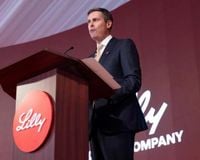Britain’s pharmaceutical landscape has erupted into controversy, as Eli Lilly CEO Dave Ricks delivered a scathing critique of the UK’s drug pricing policies, calling the nation “probably the worst country in Europe” for medicine prices. In a pointed interview with the Financial Times on September 24, 2025, Ricks warned that unless the UK government changes course, British patients could miss out on life-saving treatments and the country could lose billions in investment. His remarks have reignited a fierce debate, drawing in global industry leaders, politicians, and healthcare experts, and sparking concerns about the future of the UK’s once-thriving life sciences sector.
At the core of this dispute is the Voluntary Scheme for Branded Medicines Pricing, Access and Growth (VPAG), a 2024–2028 agreement between the UK government, the National Health Service (NHS), and pharmaceutical companies. The scheme is designed to keep NHS spending on branded medicines within budget by requiring drugmakers to pay hefty rebates—currently set at a minimum of 23.5%, a figure that far outpaces similar rates across Europe. For pharma giants like Eli Lilly, Merck, and AstraZeneca, these rebates have become a major sticking point. “We would like to get rid of the clawback scheme called VPAG, which charges us for our own success,” Ricks told the Financial Times. He added bluntly, “Unless that changes, I don’t think they will see many new medicines and I don’t think they will see much investment.”
The impact of these policies is already being felt across the UK’s pharmaceutical sector. In August 2025, Eli Lilly temporarily halted shipments of its popular weight-loss drug Mounjaro in the UK, just before implementing a 170% price increase. Ricks explained the move by pointing to cross-border demand: “What we had seen is people taking trains from Paris to buy UK Mounjaro. That doesn’t make a tonne of sense for us.” The company also paused part of a £279 million project intended to support biotech startups, highlighting the growing reluctance among global drugmakers to invest in Britain under current conditions.
Other industry heavyweights are following suit. Merck announced in September 2025 that it would scrap its planned London research hub, exit laboratories at the Francis Crick Institute and London Bioscience Innovation Centre, and cut 125 jobs. AstraZeneca, the UK’s largest drugmaker, has paused a planned £200 million expansion of its Cambridge research campus and earlier this year cancelled a £450 million vaccine plant in Liverpool after failing to secure government support. In total, four major projects worth more than £1.8 billion have been scrapped or suspended in 2025 alone, with industry figures warning that at least 13 major investment decisions have gone against the UK since 2022.
The fallout is not limited to the giants. Novartis, another major player, has reduced its UK presence from seven sites and over 4,000 staff to a single London base employing just 1,200. Bristol Myers Squibb cancelled 34 partnerships with the NHS in the past year due to what it describes as chronic underinvestment. Guy Oliver, the company’s UK head, told The Times, “There is a human cost to all of this. Patients are really suffering, and have been suffering for many, many years now.” Paul Naish, Sanofi’s UK head of market access, echoed this sentiment, calling the situation “intolerable” for patients and urging the government to work more closely with the industry to resolve the impasse.
The government, for its part, has acknowledged the sector’s discontent but maintains that fiscal constraints limit its ability to offer more generous terms. Health Secretary Wes Streeting’s “generous” offer to the industry was rejected in late August, resulting in the collapse of negotiations and leaving the VPAG scheme in place at levels the industry deems unsustainable. A government spokesperson insisted, “Our door remains open to future engagement.” Science Minister Ian Murray described Merck’s withdrawal as “deeply disappointing” but framed it as a commercial decision shaped by global trends. However, opposition politicians are not convinced. Conservative shadow science secretary Julia Lopez was blunt: “Simply put, the UK is not internationally competitive. The government must wake up, and do so now.”
Industry leaders argue that the UK’s strict pricing regime is not just stifling investment, but also jeopardizing patient access to new and innovative treatments. The consequences, they warn, could be long-lasting. Sir John Bell, emeritus regius professor of medicine at Oxford University, highlighted a worrying trend: “Ten years ago, we used to spend 15% of our healthcare spend on pharmaceuticals. Now it’s 9%. The rest of the OECD are sitting between 14 and 20%.” He cautioned that unless the UK begins to value innovation, large companies will continue to divert their investments elsewhere. “The large companies do have to work in a system where they can sell their products, and if they can’t sell their products here, they’ll go and do their business somewhere else,” Bell told the BBC.
Compounding the UK’s difficulties are pressures from across the Atlantic. Former US President Donald Trump has repeatedly demanded lower drug prices for American consumers and more domestic investment, threatening tariffs of up to 250% on pharmaceutical imports. This tough stance has prompted many pharma groups to pivot towards the US market, further diminishing the UK’s attractiveness as a destination for investment. Merck’s decision to abandon its King’s Cross development, which had been set to open in 2027, was attributed in part to this shift, as well as to global cost-cutting measures that include 6,000 job cuts and plans to save $3 billion annually.
Eli Lilly, meanwhile, is expanding aggressively elsewhere. The company recently unveiled plans for a $6.5 billion manufacturing facility in Houston, Texas—a move Ricks said was unrelated to the Biden administration’s September 29 deadline for companies to commit to lowering drug prices, though he admitted the outcome of ongoing negotiations remained uncertain. “It is hard to quantify” the impact if no deal is reached, Ricks remarked. “Is it the Justice Department is going to come litigate us? Maybe. Is it the [Food and Drug Administration] will stop approving drugs? Maybe.”
While the UK grapples with uncertainty, Eli Lilly is also setting its sights on India, preparing to launch an oral version of its blockbuster weight-loss drug Orforglipron. According to Patrik Jonsson, executive vice-president of Eli Lilly, “We are preparing for regulatory submissions for chronic weight management and obesity by the end of this year. Approvals in many countries are likely in the second half of 2026.” The company’s Mounjaro KwikPen debuted in India in August at a starting price of ₹14,000 (about $160), following strong sales of its injectable vials earlier in the year.
This global pivot underscores a stark reality: as the UK’s drug pricing policies come under intense scrutiny, pharmaceutical giants are increasingly looking elsewhere for growth. With billions in investment, hundreds of jobs, and—most crucially—patient access to life-changing medicines at stake, the stakes could hardly be higher. Whether the government will heed these warnings and strike a new deal with industry remains to be seen, but for now, the future of Britain’s life sciences sector hangs in the balance.





